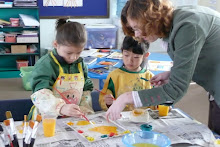I’m currently Stateside for Chinese New Year holiday. My friend Amy’s oldest son is in kindergarten this year. Yesterday we had an experience that was laden with technology. First off, Amy texted messaged me to see what I was doing. We had our entire conversation over SMS text messages and then she showed up at my door to pick me up.
So Davis and I went to his school and we did his Accelerated Reading. You sign the student into a computer program and after you read the book, you take a computer based comprehension test. Students earn ‘points’ for each book that they make a passing score on when they take a test. This process is simple. It’s natural. In fact, when we were done testing and reading about five books Davis and I picked out a ‘fun’ book to read that he wouldn’t be required to test on. It was a book on Volcanoes. It took him until halfway through the book for him to realise ‘Wait, I don’t have to test on this book, do I? Can you make a volcano with me?” The concept of reading a book without a computer-based component was something he wasn’t quite used to doing.
It all seems very commonplace and not out of the ordinary to me, until I start to think about it. My first-grade students are also a part of this culture now – worlds without technologies are non-existent to them. This makes the job of me the teacher, very important. It is up to me to make sure that they learn how to interact with it so they are prepared to interact with everyone else who is using it.
• What do you expect are the students’ cognitive outcomes when the students use technology?
I guess I expect that my student’s are able to use higher order thinking skills. I want them to be able to problem solve and to not be frustrated. I want them to be able to communicate, using technology, how they use computers, Internet and programs to do daily activities. I expect them to cognitively remember how to do these basic tasks; to they can focus on the process of creating rather than worrying about how to create. I see this a lot in my kid’s writing. This year, my kids love to write. They beg me to give them free writing time in their journals. As a former 8th grade English teacher, this makes me ecstatic and I usually comply. However, most of them are ESL students and have not yet learned how to spell words that are unfamiliar to them. It sometimes causes them problems. They get ‘stuck’ in the figuring out how to spell that they lose their idea of what they were writing about. I don’t want a similar situation for them when it comes to using technology in content area subjects.
• What do you expect are the students’ affective outcomes when the students use technology?
One of my favourite traditions is my airplane book. Yes, buying a book at the airport (especially if you’re in a country that doesn’t speak English) can get expensive. Yes, I could just put a book on my Kindle for iPod touch, and it would be less bulky….
But ever since I’ve had my passports at the ripe age of 9 months, I’ve had my airplane book every time I travel. On my way home, I picked up two books in the Beijing airport, one of them being Thomas Friedman’s The World is Flat. I’m only 137 pages into his explanation of the history of digital-technology advances and I’m fascinated. Here’s a quote from his book that grabbed so much I had to underline it.
“Once a standard takes hold, people start to focus on the quality of what they are doing as opposed to how they are doing it” (pg 84).
I think this sums up exactly what technology will do for our students. Many of us as teachers, and even our students to a degree, are in the process of trying to figure out how they will produce or use software. I know when I plan my lessons, my main focus is on how I can make the projector work and be set up and the website not be blocked and my students actually gain something out of it. I’m challenged to move beyond that. Once technology in education is standard, my students will be affected in a way that goes far beyond the mechanics of figuring out HOW to produce something and they can really begin to focus on WHAT they are making. This affective outcome will revolutionise not just our students but also the world in which they live everyday.
Wednesday, February 3, 2010
Subscribe to:
Post Comments (Atom)


No comments:
Post a Comment